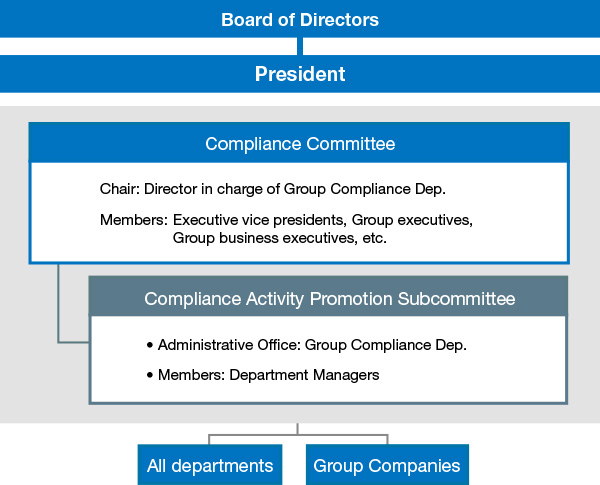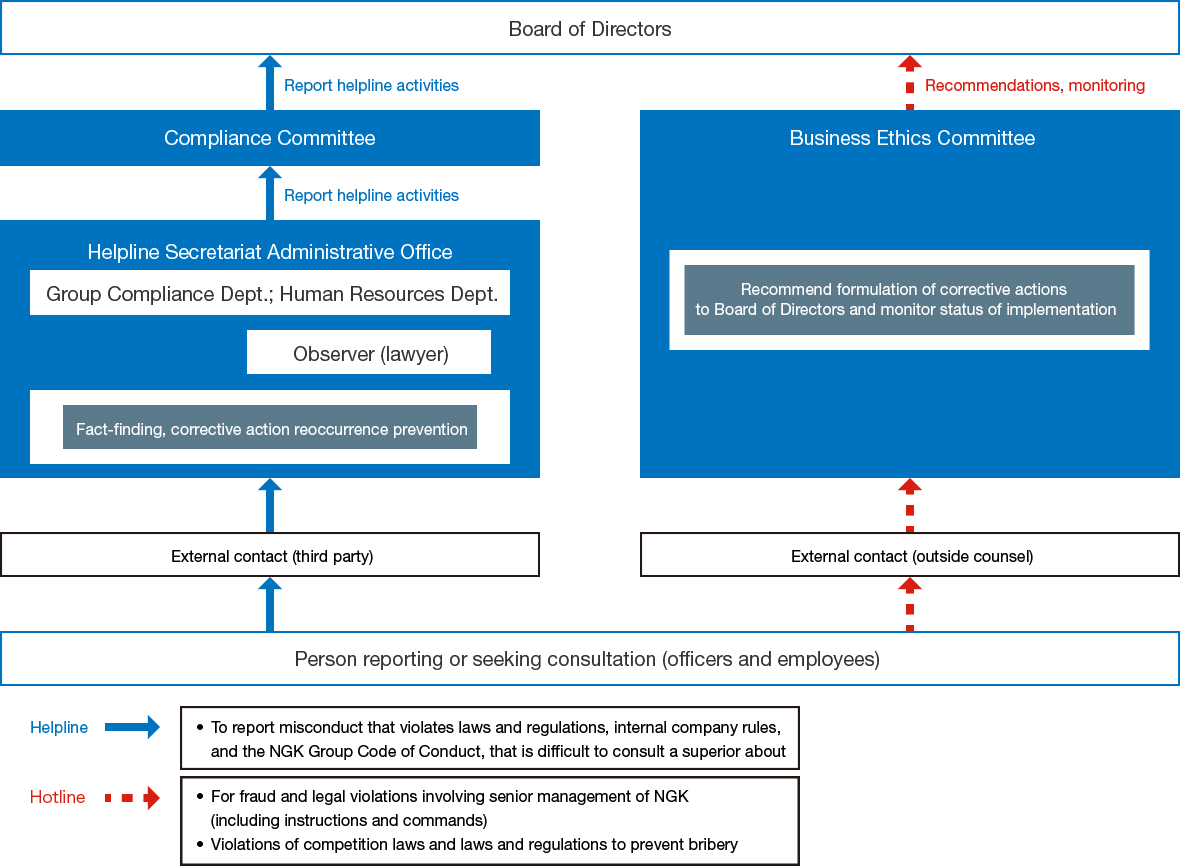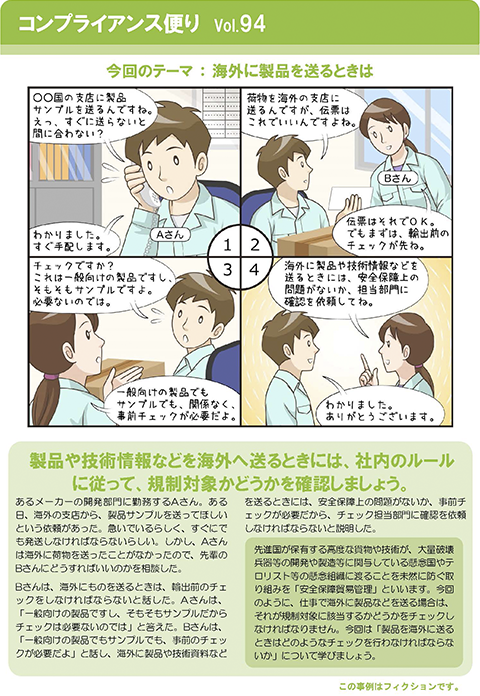Sustainability
Compliance Promotion Structure
NGK Group Corporate Business Principles and Code of Conduct
The NGK Group Corporate Business Principles expresses our basic way of thinking for carrying our corporate activities. The NGK Group Code of Conduct sets forth the items that our officers and employees should comply with. All NGK Group employees will act with high ethical standards according to these principles and norms as they fulfill their social responsibilities throughout the entire supply chain to build societal trust in the NGK Group. These have been translated into 13 languages, including English and Chinese. At the beginning of each fiscal year, we provide notifications to ensure each and every member of the NGK Group is aware of and thoroughly understands these documents.
We also began using the company intranet to show popup notifications about the Corporate Business Principles on the computers of all employees at NGK and Group companies in Japan.
The NGK Group checks for violations of the NGK Group Corporate Business Principles, NGK Group Code of Conduct, relevant laws and regulations, etc., through internal audits, our whistleblower system, compliance awareness surveys, and the like. Moreover, we periodically review the effectiveness of these guidelines and norms through reporting to and discussion by the Compliance Committee, and make relevant improvements.
NGK Group Corporate Business Principles and Code of Conduct
Scope of Application
The NGK Group Corporate Business Principles apply to all employees and suppliers of the NGK Group. Employees are provided with training and the NGK Group Code of Conduct guidebook upon joining the NGK Group to familiarize them with these principles. They also receive job grade-specific training and other instruction.
Non-Compliance Incident Reports
In FY2024, there were no incidents of serious non-compliance in the NGK Group.
Number of Compliance Violations
NGK Group Basic Guidelines for Compliance Activities
The idea of what constitutes good compliance activities continues to evolve worldwide amidst a changing social and legal landscape, and the NGK Group requires mechanisms for objectively evaluating and verifying, as well as continually improving, its own activities in light of international norms. It is also important that compliance-related activities as a whole be improved qualitatively by ensuring that compliance-related ideals and values be standardized not only in areas of legal compliance but also in areas such as safety, the environment, and quality. Thus, in FY2021, it was in this context that the new NGK Group Basic Guidelines for Compliance Activities were created in order to codify in writing the NGK Group’s basic stance on, and approach to, compliance activities. And we are making sure that all employees in and outside Japan are aware of and understand them. Based on our NGK Group Basic Guidelines for Compliance Activities, related business groups and departments are working together to qualitatively improve compliance activities with regard to safety, the environment, quality, exports, human rights, competition laws, and the like, so that they are more effective.
Compliance Promotion Structure
The NGK Group has established a Compliance Committee, which reports directly to the president. A Compliance Activity Promotion Subcommittee was established as part of the Compliance Committee to ensure proper execution of the Committee’s work. The Compliance Committee regularly reports the matters it handles to the Board of Directors, and the Board of Directors supervises the activities of the Compliance Committee.
Compliance Promotion Structure Chart

Since FY2021, we have asked Group companies to select compliance administrators and compliance officers and have begun discussions with them to establish the foundations of an effective and efficient compliance structure for the entire NGK Group. The Group Compliance Department is also leading the introduction of innovative training formats in each company using hybrid communication that includes group discussions as well as online and in-person meetings in an effort to enhance learning through interactive education. We have participants fill out questionnaires after they complete the training to gauge their level of understanding and consider improvements for the next round of training. The goal of pursuing these efforts is to make sure that each NGK Group company will be able to independently formulate, implement, confirm effectiveness, and improve compliance measures in the future.
Mission of the Group Compliance Department
- Embed the idea of “compliance first” within the corporate culture across the NGK Group
- Ensure thorough compliance throughout the NGK Group by promoting compliance activities, which meet international norms and establish mechanisms for ongoing improvement
- As for Group companies outside Japan, promote compliance for our globalized operations by obtaining the most up-to-date information regarding applicable laws and social demands in each region
Mission Achievement-Focused Initiatives of FY2024
- At the beginning of the year, the president shares a message about compliance being our top priority (continued from previous years)
- During Compliance Strengthening Month in October, we shared the President's message and put up educational posters
- Promoting awareness of NGK Basic Guidelines for Compliance Activities and providing examples of its utilization in department work
- Risk-based compliance education (NGK and Group companies in and outside Japan) with a focus on effectiveness
- Adapting to global laws and regulations (competition laws, anti-bribery laws, etc.)
- Operation and maintenance of a whistleblowing system (In Japan: Check operational status of revised Whistleblower Protection Act, Outside Japan: Adapt to EU Directive on the Protection of Whistleblowers, and review each company’s regulations)
Interaction with Suppliers
We ask all of our suppliers to comply with the NGK Group Supplier Code of Conduct. This code of conduct stipulates specific initiatives related to ethics and compliance, including comprehensive measures for anti-corruption, intellectual property protection, and fair trading. We ask all our suppliers to consent to compliance with this code once a year. We also ask suppliers to consent to compliance with this code when starting new transactions.
Whistleblowing System
The NGK Group has established various whistleblowing systems to detect compliance violations early and to promote the organization's self-purification function.
The Helpline and Hotline are internal reporting systems that comply with the Whistleblower Protection Act and other relevant laws and regulations. These systems can be used by everyone who works at NGK and every Group company location. This includes officers, employees, employees dispatched on external assignments, advisors, contract employees, temporary employees based on a temporary employment agreement, resident employees accompanying a service contract, and those who have left the company within the last year.
Reports and consultations are generally accepted by an external contact operated by a third party via telephone or the internet. The systems handle consultations and reports not only in Japanese but also in English. Additionally, if the reporter or consulters prefers not to disclose their name or affiliation to the reception window or company (anonymity), their reports and consultations will be accepted anonymously.
Our internal regulations guarantee protection of those seeking advice or reporting issues, and the NGK Group Code of Conduct prohibits retaliation against those who make reports. Moreover, only workers who have received instruction based on the Whistleblower Protection Act can handle consultations and reports. The workers also undergo regular training as stipulated by our internal regulations. Upon receiving a report or consultation, we will carry out the response process from investigation to corrective actions under the advice of external independent lawyers and all the processes will be conducted in a fair, impartial and honest manner. If the investigation reveals misconduct or a violation of the law, NGK will impose penalties on those involved in accordance with our employment regulations.
In addition, we have established a system to receive reports from all stakeholders involved in the business activities of the NGK Group (such as suppliers, customers, and local residents) through contact points such as the supplier helpline and our website.
Organization of Whistleblowing System

Helpline
We have established a helpline to receive inquiries and reports from employees aimed at curtailing and preventing activities contrary to the spirit of the NGK Group Corporate Business Principles and Code of Conduct and to facilitate quick resolution when issues occur. Each Group company outside Japan has its own helpline.
Senior management officers and managers undergo training regularly conducted by external lawyers about how to handle consultations, investigation of the facts, matters to bear in mind concerning corrective action, and specific case studies on reports of incidents including harassment and how to deal with it. In FY2024, this training included examples of fraudulent case, in addition to power harassment case.
Number of Helpline Consultation / Reporting Cases
In FY2024, there were a total of 42 consultations and reports. Each case was handled carefully following the process from receipt, investigation, judgment, and corrective measures in consultation with third-party outside lawyers. Although none of the details of the whistleblowing had an impact on company operations, compliance violations were confirmed in 5 cases, and corrective measures were promptly taken. We continue to periodically evaluate and improve the effectiveness of the NGK Group Corporate Business Principles and Code of Conduct, and our compliance measures based on the content of these reports and consultations.
Hotline
We have established a hotline as a whistleblowing system for responding to fraud and legal infractions committed by senior management of NGK, and all violations related to competition laws and anti-corruption laws. Outside lawyers manage the hotline and the Business Ethics Committee, which consists mainly of outside directors, handles issues. The Committee reports these issues to the Board of Directors and takes corrective steps.
We have set up similar hotlines for all Group companies outside Japan. We are working to appropriately operate these hotlines through the support and supervision of the Group Compliance Dept.
Communication with Stakeholders
The NGK Group has established contact points not only for employees working within the group but also for a wide range of stakeholders to provide information on compliance violations in order to ensure the early detection of compliance violations and to further promote the organization's self-purification function.
The website contact accepts reports from all stakeholders who have some form of interest in the NGK Group, including customers, shareholders, and local residents.
Additionally, for stakeholders who are suppliers from whom the NGK Group directly procures goods and services, we have established a dedicated contact point, the Supplier Helpline.
Anti-Corruption Structure
Assessing Risk and Dealing With Corruption
The NGK Group carries out risk management for major compliance risks, including corruption, by considering them from a management-level perspective. We then sort those deemed important risks into the categories of business environment, strategy, and internal factors, and continually review them. The Compliance Committee and other committees and responsible departments take a leading role in working to avoid and prevent risks in each business by conducting risk analysis through surveys and the evaluation of special risks in internal control processes.
Compliance Education
Compliance Education for Employees
Compliance training and awareness among corporate officers and employees is driven primarily by the Group Compliance Department and the Legal Department. In addition to career training and training for employees to be posted overseas, we provide Laws and Compliance Seminars to explain laws and regulations and to introduce case studies. Since FY2018, we have included quality compliance and contract observance as part of our career education courses.
Compliance Education Conducted in FY2024 (Overall)
| Name | Target | Content | Instruction format | Number of sessions |
|---|---|---|---|---|
| Career education | New hires | Compliance, competition laws, anti-bribery regulations | Seminar by in-house instructor | 1 |
| Promoted or career-change employees | Compliance, Corporate Business Principles / Code of Conduct (Honest Business Activities) | Video presentation | 2 | |
| Mid-career hires | Compliance, competition laws, anti-bribery regulations, Corporate Business Principles / Code of Conduct (Honest Business Activities) | Seminar by in-house instructor / Video presentation | 1 | |
| Newly appointed supervisors | Compliance, competition laws, anti-bribery regulations, quality compliance, contract observance, security export control, Corporate Business Principles / Code of Conduct (Honest Business Activities) | Seminar by in-house instructor / Video presentation | 1 | |
| Newly appointed managers | Compliance, competition laws, anti-bribery regulations, quality compliance, contract observance, security export control | Seminar by in-house instructor | 1 | |
| Managers promoted to second grade | Compliance, quality compliance | Seminar by in-house instructor | 1 | |
| Training for employees scheduled for postings abroad (global training) | Employees scheduled for postings abroad | Competition laws, anti-bribery regulations, security export control | Video presentation | 1 |
| Compliance education | Managers and sales staff of Group companies outside Japan | Compliance, competition laws, anti-bribery regulations | Lecture provided by lawyer and e-learning | 19 (24 sites) |
| General employees of NGK and Group companies in Japan | Compliance, harassment prevention, whistleblowing system | Video presentation | 1 | |
| Sales staff of NGK and Group companies in and outside Japan | Anti-bribery regulations | Lawyer-led seminar | 4 | |
| Executive officers | Competition laws | Lawyer-led seminar | 1 | |
| Newly appointed executive officers | Companies Act and competition laws | Lawyer-led seminar | 1 | |
| Managers and sales staff of NGK and Group companies in Japan | Competition laws | Lawyer-led seminar / video presentation | 1 | |
| People responsible for Competition Law Practice, etc. | Oral training on competition law | Seminar by the Compliance Department | 2 | |
| Laws and Compliance Seminars | Managers and other targets depending on content | May About damage compensation |
Seminar by in-house instructor / video presentation | 1 |
| July Best practices for preventing bribery —Bribery laws and regulations and international business— |
Seminar by outside lawyer / video presentation | 1 | ||
| September About the Freelance Act |
Seminar by in-house instructor / video presentation | 1 | ||
| November Trends in harassment as seen in court cases —Along with how to use the whistleblower system — |
Seminar by outside lawyer / video presentation | 1 | ||
| January Latest trends in insider trading regulations |
Seminar by in-house instructor / video presentation | 1 | ||
| March Practical considerations related to copyright |
Seminar by in-house instructor / video presentation | 1 |
Competition Law Education Conducted in FY2024
| Name | Target | Content | Number of sessions |
|---|---|---|---|
| Training for newly appointed directors | Newly appointed directors and executive officers | Live seminar by outside lawyer | 1 |
| Competition law compliance lectures | All directors, managers, and sales staff of NGK and its Group companies in Japan | Streamed video of live seminar by outside lawyer | 2 |
| Compliance training for Group companies outside Japan | Managers and sales staff of Group companies outside Japan | Lawyer-led live seminar; e-learning; seminar conducted by an in-house instructor | 19 (24 sites) |
| Training on competition laws by internal lecturer | Targets depend on content | Department-requested on-site training | 2 |
Anti-Bribery Training Conducted in FY2024
| Name | Target | Content | Number of sessions |
|---|---|---|---|
| Training for sales staff | Sales staff in Japan and some Heads of Group companies outside Japan | Anti-bribery regulations | 4 |
| Legal Compliance Seminars | Managers of NGK | Anti-bribery regulations | 1 |
| Compliance education | Managers and sales staff of Group companies outside Japan | Live seminar by outside lawyer and online seminar; seminar conducted by an in-house instructor; conducted using paper-based resources | 19 (24 sites) |
Conducting Anti-Bribery Training
In addition to having in-house lecturers provide job grade-specific training to NGK employees, in FY2019 we began conducting training for sales department employees that incorporates interactive lectures by outside lawyers and group discussion of case studies relevant to participants’ work. We also arrange lawyer-led seminars and other training at all Group companies. In addition, starting in FY2023, we have expanded the scope of training from just the sales department to include other departments that are exploring new businesses.
Other Dissemination Activities
Compliance Newsletter
Once a month we publish a Compliance Newsletter to the company intranet that uses four-frame cartoons to allow readers to learn about topics relevant to them in an easy-to-understand manner. We use examples to explain in detail what readers should learn.

Themes Covered in the Compliance Newsletter in FY2023
| April | Why are we working towards SDGs? |
|---|---|
| May | What if someone has trouble communicating? |
| June | What if you illegally take customer information out of the company? |
| July | Can we omit inspections if we are not going to make our delivery deadline? |
| August | What if you use a company phone for personal matters? |
| September | What is integrity? |
| October | Compliance Strengthening Month |
| November | What if I experience same-sex sexual harassment? |
| December | Human Rights Week |
| January | Do you have healthy relationships with your business partners? |
| February | What is disguised contracting? |
| March | Are you making workers work illegal overtime? |
Compliance Strengthening Month
Since FY2017, we have declared October to be Compliance Strengthening Month, and take actions such as sharing the President's message, putting up educational posters, and making sure employees know about the internal whistleblowing hotline. In FY2024, we distributed a video message from the President to NGK and our Group companies both inside and outside of Japan.
Compliance Award
In FY2021, we launched the Compliance Activities Award System. This system recognizes particularly outstanding activities, among the initiatives pursued by each department and Group company inside and outside of Japan, that demonstrate qualities such as autonomy and originality. We also publicize them within the NGK Group as good examples. In FY2024, we recognized the Digital Society Business Group for their organizational vitalization through exchange activities and improvements to the workplace environment. We also presented certificates of commendation from the Compliance Committee Chair, and exchanged opinions with members of the award-winning divisions.
